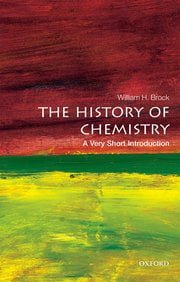The History of Chemistry: A Very Short Introduction
William H. Brock
OUP
ISBN: 9780198716488

This may be a short history, but it offers fascinating insights into the development of a very hard-won field of knowledge.
The first chapter, nicely entitled On the Nature of Stuff, outlines the early days of chemistry and considers its relationship with alchemy. It used to be assumed that these fields had been clearly distinguished from each other at least since the 16th century. Recent research, however, shows that alchemists often thought in corpuscular terms and measured quantities in reactions, as chemists do. “Alchemy” and “chemistry” were interchangeable terms in the 17th century, so it is suggested that the old word “chymistry” be used for both fields up until the century’s end. By the 18th century, chymistry became chemistry, and alchemy was put in its non-scientific place, especially by French chemists in the Académie des Sciences.
In the same century came the professional separation between pharmaceutical chemists and philosophical chemists, who disdained the former yet, despite their own appellation, applied chemistry to agriculture, mining and other technics. In the same chapter, Gases and Atoms, Brock discusses chemistry’s relationship to physics: chemists reject any reduction of chemistry to physics.
In Types and hexagons, we meet paper chemistry, the manipulation of chemical symbols on paper, and see the withering away of vitalism with the advent of synthetic organic chemistry. In Reactivity, a new area emerges – physical chemistry – and becomes the foundation of the whole field. In the 20th century, chemistry comes to be seen, at least by some, as “becoming the fundamental basis – the central science – for the study of nature”.
This view has persisted into this century, despite the proliferation of cross-disciplinary science and technology, so that Brock concludes his brief but rich history by noting that “practising chemists prefer to see chemistry as the central science that underpins the physical and biological sciences”, such that, as Leibig said, “everything is chemistry”.



